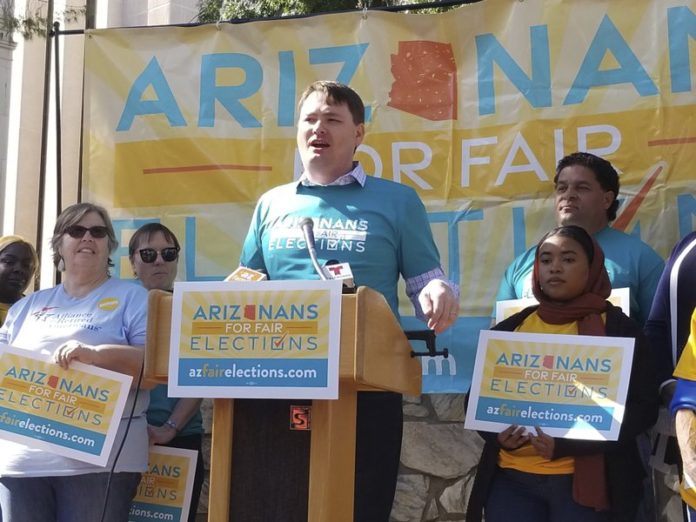
An Arizona advocacy group for clean elections took the first step Wednesday to getting an ambitious set of elections reforms on the 2020 ballot.
Arizonans for Fair Elections announced it filed paperwork for an initiative that would create an automatic voter registration system, ban special interest gifts and make other changes. Voters of all socio-economic backgrounds — not money — should be shaping elections, the group said.
These reforms are needed bring a voice to voters of all political parties, said Joel Edman, executive director of the Arizona Advocacy Network.
“Corporations, wealthy interests are represented too much. The kind of reforms we’re pursuing are popular with voters across all political stripes,” Edman said during a news conference outside the statehouse. “I certainly hope this doesn’t become any kind of partisan fight.”
The proposed measure is aimed at aiding working-class and rural voters, including tribes.
Rossetta Walker, of Tempe, is a member of the Sicangu Lakota tribe as well as a volunteer Maricopa County elections department deputy registrar. She said there need to be changes so that voting isn’t a hardship for those living on tribal land like the Navajo Nation. For many, trying to find one of the handful of polling places discourages voting.
“That means the grandmothers and grandfathers have to ask their family members to drive them three hours to a polling booth to cast their ballot — if they got their ballot in the mail,” Walker said. “Those challenges need to be addressed.”
Eligible voters would be able to automatically register when they apply for or renew a driver’s license. They could even register on the day of an election.
Other proposed changes include expanding polling hours and keeping in-person early voting sites open up to the day before Election Day.
It would also call on election officials to update voter registration lists.
The proposal also wants to take money and gifts out of the equation. Under these reforms, politicians and lawmakers couldn’t accept gifts from travel to meals and would have to reveal smaller contributions. It would also call for a two-year gap before a high-ranking legislator or public official could become a lobbyist. Lobbyists would see their registration fees double.
Garrick Taylor, a spokesman for the Arizona Chamber of Commerce, said the chamber typically is averse to any measure that dramatically decreases donation allowances for individuals and political action committees.
“Chipping away at donors’ ability to exercise their voice is unwise. We are typically gonna land on the side of the argument that says more speech is better, not less,” Taylor said.
Edman said money from an optional $5 tax donation to the Citizens Clean Elections Fund would help pay to put the measure into action. Another funding source would be raising the state’s corporate minimum income tax for larger businesses from $50 to $150.
The measure needs roughly 238,000 signatures by July 2 to qualify for the ballot.
Republished with the permission of the Associated Press.













